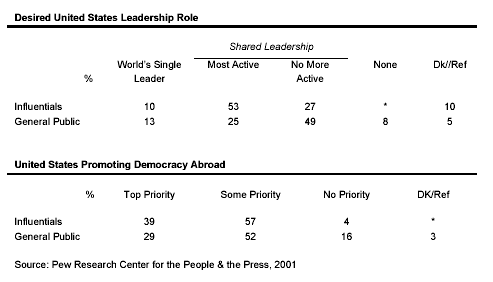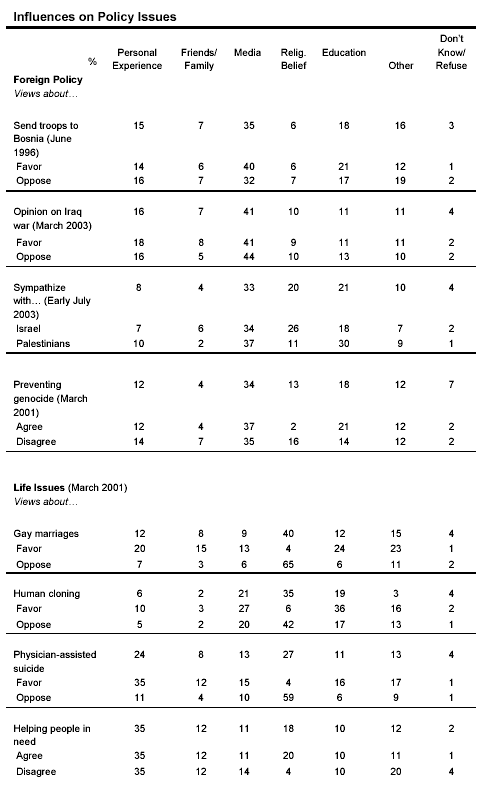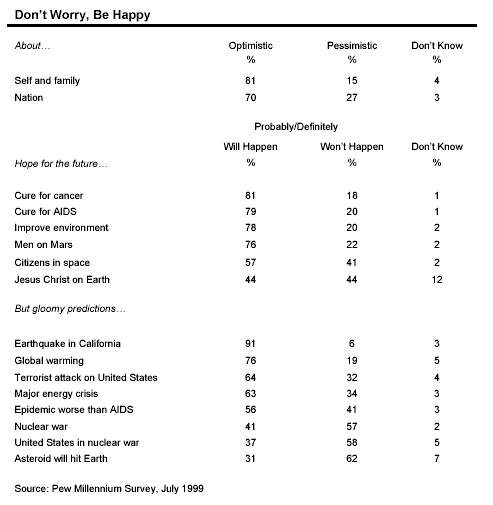by Andrew Kohut and Bruce Stokes
Why is anti-Americanism on the rise? In their new book, America Against the World, Pew Research Center President Andrew Kohut and journalist Bruce Stokes explore findings from the Pew Global Attitudes Project’s series of international surveys that highlight the role American values play in the worldwide rise in anti-Americanism in the 21st century. In the following excerpt, the authors examine the major factors, real and imagined, that contribute to this growing alienation between America and other countries, both friends and foes, around the globe.
Differences in American values and attitudes, modest as many may be, do matter in the daily relations between nations because of the status of the United States as an unprecedented superpower and the driving influence of American business and culture. While other publics hold exceptional views, Argentine, Czech, and Japanese exceptionalism do not face such resistance because Argentina, the Czech Republic, and Japan do not dominate the globe the way that the United States does. Americans’ exceptionalism is America’s problem, not so much because Americans are that different from others, but because any dissimilarity in attitudes or values is magnified by the United States’ place in the world, and others often resent those differences.
In pursuing these differences, it is helpful to differentiate between three types of American exceptionalism that shape both the ways that U.S. citizens look at the world and the ways that the world looks at them:
- Misunderstood exceptionalism — American values and attitudes that many in the United States as well as abroad regard as part of the problem, though there is little evidence to support this contention.
- Conditional exceptionalism — Aspects of the American character that are distinctive, but not so much that they are destined to consistently divide the American people from the rest of the world. These include values and attitudes that are products of the times or subject to the course of events and the influence of American leadership.
- Problematic exceptionalism — How Americans view themselves, their country, and the world in ways that reflect potentially unbridgeable, persistent gaps in opinions on important issues.
Not all characteristics that distinguish Americans fall neatly into one or another of these categories, of course. And it is important to emphasize that we use the term exceptionalism without the normative judgments — specifically, the implication of superiority–often associated with it. Whether the special qualities of American attitudes and values have encouraged a sense of American superiority is an issue to be explored.
Misunderstood
Two aspects of the American character — nationalism and religiosity — are assumed to significantly influence the way the United States conducts itself in the world. As Minxin Pei of the Carnegie Endowment for International Peace has put it, “Today’s strident anti-Americanism represents much more than a wimpy reaction to U.S. resolve or generic fears of a hegemon running amok. Rather, the growing unease with the United States should be seen as a powerful global backlash against the spirit of American nationalism that shapes and animates U.S. foreign policy.”1
Reflecting the world’s worries at the time of the run-up to the war in Iraq, the editors of The Economist opined that, “only one thing unsettles George Bush’s critics more than the possibility that his foreign policy is secretly driven by greed. That is the possibility that it is secretly driven by God….War for oil would merely be bad. War for God would be catastrophic.”2
Such punditry makes convincing reading because it reinforces longstanding prejudices. And certainly, long-term U.S. support for Israel, and, more recently, strong support among Christian evangelicals for the repossession by the Jewish people of the land promised in the Bible, have heightened concern in predominately Muslim countries — as well as in Europe — that America is on a religious crusade. But little hard data support the idea that either religiosity or nationalism plays a significant role in Americans’ actual opinions about how the United States should relate to the world.
The City on a Hill Syndrome
Nothing is more vexing to foreigners than Americans’ belief that America is a shining city on a hill — a place apart where a better way of life exists, one to which all other peoples should aspire. And, compared with Western Europeans, average Americans are more likely to express their pride and patriotism. In 1999, when Americans were asked to account for their country’s success in the 20th century, they credited the “American system.” Many among the public may have been frustrated by how the system operated, but they liked the design.
At the same time, Americans also hold a number of other attitudes that mitigate their nationalism. Most important, contrary to widespread misconceptions, Americans’ pride in their country is not evangelistic. The American people, as opposed to some of their leaders, seek no converts to their ideology. A Gallup poll taken in February 2005, just days after President George W. Bush’s State of the Union address in which he made far reaching and eloquent calls for increased democracy in the Middle East, found that only 31 percent of the U.S. public thought that building democracy should be a very important goal of U.S. foreign policy. Their real priorities were preventing the spread of weapons of mass destruction and maintaining U.S. military power, not planting the flag of American-style democracy in far-away places. A subsequent poll for the Chicago Council on Foreign Relations, conducted in September 2005, found only 27 percent of the public strongly committed to spreading democracy.3
Similarly, while U.S. citizens are alone in thinking it is a “good thing” that American customs are spreading all around the world, they see people from other countries benefiting more from such Americanization than themselves. Americans are accused of believing “Aren’t we great? Do as we do!” In reality, they are far more likely to say, “We think the American way is great; we assume you want to be like us, but, if you don’t, that’s really not our concern.”
The ordinary American’s modest appetite for spreading U.S. ideals goes hand in hand with the public’s lack of imperial aspirations. Consider the American reaction to the collapse of the Soviet Union. While pundits and politicians made much of the vindication of democracy and capitalism, ordinary Americans barely paid attention–less than half the public very closely followed news about the fall of the Berlin Wall in 1989, according to Times Mirror Center for the People & the Press surveys at the time. Far from a mood of triumph or hunger for world domination, the American public became even more indifferent to international affairs than it had been, while the size of the isolationist minority in the United States rose to a 40-year high.
Today, in a more dangerous and contentious time, even American elites — academics, journalists, business leaders and so forth — show few aspirations for empire and little appetite for proselytizing. While two out of three American opinion leaders believe that the United States should play a strong leadership role in the world (twice the proportion of the public at large), fewer than 10 percent think the United States should be the single world leader– a consistent finding in surveys throughout the 1990s and into 2001. Further, American elites have not given the spread of democracy around the world much greater priority than has the average citizen.4

It is true that the idea that the United States should play the evangelist because its values are the “right” ones has in recent years echoed in speeches by America’s leaders and in commentaries by political analysts. Writing in the Weekly Standard, Robert Kagan and William Kristol asserted in 2002 that “September 11 really did change everything…. George W. Bush is now a man with a mission. As it happens, it is America’s historic mission.”5 But while Bush administration officials and many neo-conservatives have given the impression that U.S. nationalism is proactive and evangelistic, their views do not reflect general public opinion.
The case that Americans are dangerously nationalistic is further undermined by Americans’ refreshing penchant for self-criticism. Pew’s 2005 global survey asked people in 16 countries and the United States what words or phrases they associated with the American people. Fully 70 percent of Americans described their fellow countrymen as greedy, a harsher criticism than that leveled by any non-Americans in the survey. About half of Americans, 49 percent, saw themselves as violent, a self-criticism with which majorities agreed in 13 of the 16 other countries surveyed. These significant reservations about their own character suggest a healthy self-doubt that tempers any tendencies toward imperial hubris.
America, the Blessed Nation
American religiosity is also a growing concern to many foreigners. This is especially the case among America’s traditional European allies, who are among the most secular people in the world. However, American religious fervor also influences the views of people in some Muslim societies.
The United States has a long tradition of separating church from state — but an equally powerful inclination to mix religion with politics. Throughout the nation’s history, great political and social movements — from abolition to women’s suffrage to civil rights to today’s struggles over abortion and gay marriage — have drawn upon religious institutions for moral authority, inspirational leadership, and organizational muscle. But for the past generation, religion has come to be woven more deeply into the fabric of partisan politics than ever before.
Within the United States, there is little question that religious views have a decided impact on many social issues such as abortion, end-of-life decisions, stem cell research and homosexuality. In fact, whether a person regularly attends church or synagogue or mosque was more important in determining his or her vote for president in 2004 than such demographic characteristics as gender, age, income, and region; and it was just as important as race.
Little wonder then that a solid majority of European respondents in Pew’s 2005 poll described the American people as “too religious.” It is also not surprising that critics of President Bush would see his religious and moralistic rhetoric — especially in his use of the phrase, “axis of evil” — as just the kind of American religious fervor that they fear in U.S. foreign policy. Upon hearing that Christian fundamentalists in the United States link their support for Israel to their own apocalyptic vision of history, it is understandable that Muslims might fear that religious conservatives are driving U.S. Middle-East policy.

Yet there is little evidence that Americans make their judgments about world affairs based on their religious beliefs. For nearly a decade, Pew has asked national samples of the U.S. public how they feel about a range of concerns to discover what factors were most influential in shaping their opinions. On personal issues, such as gay marriage, euthanasia, and cloning, those who take conservative stances do largely credit their religious beliefs. But this link between religion and policy did not exist when it came to the use force in the Balkans and Iraq, or even in preventing genocide. Only when people were asked about their basic sympathies in the Israeli-Palestinian dispute did religion emerge as a significant factor and even then, Americans cited media coverage as a stronger influence on their support for Israel.
Thus, while Americans are clearly nationalistic and quite religious, there is little evidence that either their patriotism or their faith drives public support for the more activist and unilateralist U.S. foreign policy that has fueled anti-Americanism in recent years.
It All Depends
The world’s biggest complaint about the United States is that Washington too often acts unilaterally, without concern for the interests of others. Certainly the American public is ambivalent about multilateralism, running hot and cold on whether the United States should cooperate with allies or adopt a go-it-alone approach.
This conflict in public thinking was clearly illustrated in an August 2004 Pew and Council on Foreign Relations poll that found two-thirds of the U.S. public saying that the United States was less respected globally than in the past and by roughly a two-to-one margin viewing this loss as a major problem for the nation.6 But in the same poll Americans ranked improving relations with allies only ninth out of 19 international objectives. Further Pew polls that year found that Americans, unlike Europeans, felt that their country did not need to seek UN approval in order to take preventive military action to protect itself and that the United States ensure that the country remains the sole global military superpower. Three months after the August 2004 survey, voters re-elected George W. Bush, and they did so mostly because they liked the president’s leadership style and stewardship of the war on terrorism.
While we have no public opinion data dating back to the early days of the republic, it is fair to say that unilateralism and hegemony (at least with regard to the Western Hemisphere) have been accepted by the American people for most of their history. In the view of Yale University historian John Gaddis, it was not until the mid-1930s that the United States began to pursue a more multilateralist course in foreign affairs. And even then, Franklin Delano Roosevelt had to convince voters that working closely with others was the best way to preserve U.S. resources and to get the allies “to do most of the fighting.”7 This shift in Americans’ views about their relations with the rest of the world defined American foreign policy for the remainder of the 20th century. But the September 11 attacks have rekindled Americans’ support for unilateralism. That stance has clearly divided the U.S. public from its traditional allies.
Most Americans are oblivious to this alienation. Pew’s 17-nation poll in 2005 found that while 69 percent of Americans believed that the United States was “generally disliked” by people in other parts of the world, 67 percent also believed, quite contrary to the view of most people in other countries, that the United States paid attention to foreigners’ interests. This is a disconnect of a major order.8
Americans’ reawakened affinity for unilateralism also resonates with their opposition to ceding sovereignty over international endeavors. Polls have consistently found public opposition to U.S. troops serving under UN command and Americans, unlike a majority of Europeans, are not prepared to allow their soldiers to be tried in international criminal courts when charged with war crimes. U.S. citizens are also considerably less willing than other Western publics to give an international organization final say on global environmental policies.
But such go-it-alone American exceptionalism is both equivocal and conditional. While Americans are protective of their sovereignty and jealous of their right to protect themselves, the urge to be good world citizens and cooperate with allies is never far from the surface. The 2004 Pew poll also found that, by a 49 percent to 35 percent plurality, Americans continued to believe that U.S. foreign policy should take into account the interests of allies rather than be based mostly on U.S. interests. It also found rising criticism of President Bush for paying too little attention to the interest of close allies.
Furthermore, it is now the American public that seeks a closer working relationship with traditional allies, while Europeans want more space. In Pew’s 2005 survey, sizable majorities in Great Britain, France, Germany, Spain, and Holland said that their governments should take a more independent approach to security and diplomatic affairs than they have in the past. However, two in three Americans felt that the U.S. and Western Europe should remain as close ever.
Problems, You Say?
While nationalism and religiosity are misunderstood manifestations of American exceptionalism, and U.S. internationalism often depends on the tenor of the times and who is in the White House, a deep-seated individualism, coupled with an inherent optimism, truly distinguishes Americans. The American ethic of self-reliance and independence, coupled with the unparalleled economic and military success of the United States since its founding, has given Americans boundless optimism.
But these traits entail a number of problematic consequences for the U.S. relationship with the world. First, Americans’ self-reliance leads them to believe that they really don’t need the rest of the world. For example, Pew’s surveys have found majorities of Americans saying that what happens in Europe and Asia–even events in neighbor countries, Mexico and, especially, Canada–has little, if any, impact on their lives. While these polls date to the 1990s and the early days of September 2001, there is little to suggest that these attitudes have changed. Americans have remained disinterested in foreign news except when it deals directly with the United States or the war on terrorism. Polls conducted by the University of Maryland’s Program on International Policy Attitudes (PIPA) also found that, despite being citizens of the world’s leading trading economy, Americans believed that other countries benefit more from global trade than does the United States.
Indeed, Americans’ self-confidence breeds indifference and inertia toward dealing with problems generally and international problems in particular. Americans tend to minimize challenges even as they acknowledge them. In mid-1999, Pew conducted a series of major polls asking Americans to look back on the 20th century and ahead to the 21st. Despite gloomy consensus forecasts of natural disasters, environmental calamities, and international terrorism, a resounding 81 percent of adults were steadfast in their optimism about what the 21st century held for them and their families, and 70 percent believed the country as a whole would do well. Eight in ten Americans described themselves as hopeful, anticipating that the new millennium would usher in the triumph of science and technology. Majorities predicted that it was most likely cancer would be cured, AIDS would be eradicated, and ordinary people would travel in space.9

Such confidence in the face of looming problems is a key element in Americans’ “can do” reputation. But optimism can also reinforce a “muddle through” mentality, which, in turn, makes it more difficult to bring public pressure to bear on elected leaders to deal forcefully with problems that Americans themselves see on the horizon. For example, PIPA surveys showed that a very strong majority of the U.S. public believed that global warming is a real and serious problem. Yet 21 percent of respondents stated that unless global warming is a certainty, no steps should be taken to deal with it, and another 42 percent said only gradual, low-cost steps should be taken. Just 34 percent of the public said it was necessary to deal with global warming right now. Moreover 66 percent thought that the United States was either doing more or about as much to limit greenhouse gases as other advanced nations.
Finally, Americans’ strong sense of individual freedom combined with their overweening optimism leads many to think they can have it both ways. Energy is a prime case in point. Americans have long acknowledged the risk of dependence on foreign energy sources. Yet, even the September 11 attacks, carried out largely by nationals of Saudi Arabia, America’s largest oil provider, had minimal impact on attitudes toward the car culture. It was not until the sharp spurt in prices in late August and early September 2005 that support for policies such as tighter automobile fuel-efficiency standards and incentives for alternative energy-source development rose substantially. For most Americans, the high cost of gasoline represents a challenge to their assumed right to low-priced fuel, an integral part of their SUV culture.
A similar two-mindedness is apparent with respect to trade policy. Many Americans deplore the loss of U.S. jobs because of imports. But in recent years they have happily purchased record amounts of imported goods, citing their high quality and relatively low prices. In effect, Americans are saying, “protect our jobs but keep those affordable frocks and gadgets coming.”
Notes
1Minxin Pei, “The Paradoxes of American Nationalism,” Foreign Policy, May/June 2003.
2“God and American Diplomacy,” The Economist, Feb. 6, 2003.
3Gallup Survey, Feb. 7-10, 2005, based on telephone interviews with a national adult sample of 1,008. The Chicago Council on Foreign Relations and the Program on International Policy Attitudes, Sept. 15-21, 2005, based on a nationwide sample of 808 Americans (margin of error was +/- 3.5-4.0%) available at http://www.ccfr.org/publications/opinion/main.html.
4Polls from 1993 through 1995 were conducted by the Times Mirror Center for the People & the Press; those from 1995 through 2005 were conducted by the Pew Research Center for the People & the Press.
5Robert Kagan and William Kristol, “The Bush Doctrine Unfolds,” Weekly Standard, March 4, 2002.
6Pew Research Center for the People & the Press and the Council on Foreign Relations, survey: “Foreign Policy Attitudes Now Driven by 9/11 and Iraq,” August 18, 2004.
7John Lewis Gaddis, Surprise, Security, and the American Experience (Washington, D.C.: Council on Foreign Relations, 2004), p. 50.
8Pew Global Attitudes Project, “American Character Gets Mixed Reviews,” June 23, 2005.
9Pew Research Center for the People & the Press, Survey: “Optimism Reigns, Technology Plays Key Role,” Oct. 24, 1999.
10Pew Research Center, survey: “Economic Pessimism Grows, Gas Prices Pinch,” Sept. 15, 2005.




